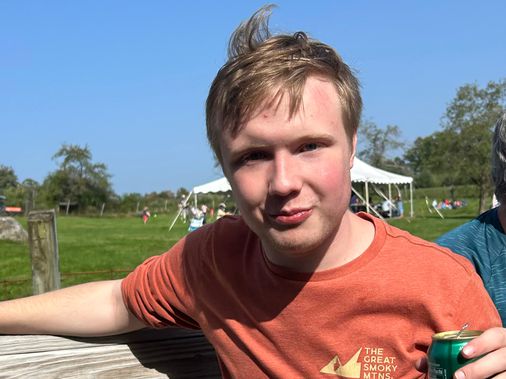Matthew was only somewhat verbal: He could understand a question, and make a simple request, but struggled to communicate much more than that. On his best days, he expressed love for his family, laughed along with their jokes, enjoyed music, was affectionate and buoyant.
As he approached puberty, Matthew got stronger, and more aggressive. He would suddenly turn red, punch, kick, and bite. He would hurt himself, and others. When Matthew began to disregulate, his mother would tell his brother, two years younger, to run to his bedroom for safety. One time, when he was about 12, Matthew went after his brother out of the blue, leaving the younger child feeling terrified and trapped.
Around the time Matthew turned 13, his father struggled to restrain him during one of his meltdowns, and knew it wasn’t going to get easier. The Carlsons had to admit they couldn’t keep Matthew, or themselves, safe anymore. And so they did what they never wanted to: They placed their son in residential care.
“Making that decision just changes you forever,” said Elizabeth Carlson. “It just doesn’t feel right. It almost feels the same way you feel when someone passes away.”
Thousands of students in Massachusetts have parents who have made the heartbreaking choice to send them to a residential school. And sometimes those schools can be perilous, beset with insufficient or poorly trained staff, and overseen by a diffuse and complicated state bureaucracy that has repeatedly failed to detect abuse and neglect before it’s too late.
As my colleague Liz Kowalczyk reported in last week’s powerful Spotlight investigation, those with severe autism and other diagnoses that make it hard for them to communicate are especially vulnerable in those settings. She tracked down a sickening tally of abuse allegations and safety complaints in 13 taxpayer-funded residential schools that specialize in treating kids with autism. Because the responsibility for overseeing these homes is spread across so many authorities, she gathered the information bit by bit, from various police departments, courthouses, and other agencies. Unless parents conduct similar investigations — or their own child is victimized or neglected — most are in the dark.
“You can’t make an informed decision,” Carlson said.
And so, along with the crushing pain and longing for their children, parents like her also feel constant fear. She never really knew what went on at his residential program at night, and Matthew couldn’t tell her. Still, she was more or less happy with his care, until his school moved him to a different group house and changed his meds two years ago, which Carlson said made his self-harming behaviors much worse.
She disagreed with his carers’ treatment decisions, and no longer trusted them to prevent his injuries. But they had the final word, and she was afraid continuing to argue with them would compromise Matthew’s care, or get him kicked out.
She decided to pull him out before that happened, sending him to a new school called Shrub Oak International, near White Plains, N.Y. On a good day, the school was three hours from their home, but moving him there wasn’t a matter of simply making the drive. As in every other stage of Matthew’s life, his parents had to engage lawyers and independent specialists to make the case for his new taxpayer-funded treatment, because it is so phenomenally expensive. Those battles have cost the Carlsons tens of thousands so far.
Though Matthew somehow got a black eye in his first couple of weeks at Shrub Oak, he seemed to be happy there, enjoying the school’s bucolic setting, his mother said. But in June, she got an email from a New York disability organization to say they were investigating allegations of “abuse, neglect, and rights violations of some students and adult residents at Shrub Oak.”
She and her husband have decided they have to get Matthew out of there.
“I am sick to my stomach having to move him again,” she said. “I’m so afraid he’s going to spiral again … but I can’t keep him there in good conscience, knowing kids have been harmed and they’re under investigation.”
Matthew, 19 now, has said he doesn’t want to leave.
Shrub Oak emailed parents to say they “do not tolerate any neglect, abuse, or any other behaviors which are not in the best interest of our students,” and that it is “extremely unlikely” any incident occurred there that wasn’t handled in a timely manner by their own security and investigations team.
The Carlsons don’t want to take the chance. So, after months of wading through more red tape, they got Matthew a spot at the May Institute in Randolph, and plan to move him in a couple of weeks. Then Carlson read the Spotlight story, which showed the May Institute had 65 licensing and safety violations since 2016.
Carlson called the school.
“I said, ‘I need you to know, we have been there and done that, and I am worried again. How are you going to handle this?,’” she said. An official from the May Institute assured her they have cameras monitoring the facility, that she could always review the tapes, that they do regular body checks for injuries, and that they’d protect her son, she said.
In the absence of adequate state oversight to keep him safe, Carlson, like every other parent with a kid in residential care, has little choice but to take yet another chance — as painful as it is.
“It’s almost as bad as when we first put him in residential,” she said. “You’re in the dark.”
Globe columnist Yvonne Abraham can be reached at yvonne.abraham@globe.com. Follow her @GlobeAbraham.
This content was originally published here.
